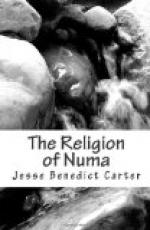Let us follow first the fortunes of the religion of the state at the hands of the politicians. The upper and influential classes of Roman society were now thoroughly imbued with Stoic philosophy and accordingly with the doctrine of the “double truth” in the field of religion—the real philosophical truth which was their own peculiar property and which showed them clearly that all the forms of religion were vain, and its doctrines at best a clumsy statement in roundabout parables of a truth which they saw face to face; and that lower “truth” intended for the masses and dictated by the pressure of necessity, the concrete state religion in all its details, which must be preserved among the lower classes in the interest of the state and of society. The state religion was thus a matter of expediency and of usefulness. But once this idea of its usefulness was put into the foreground, it was natural that the question should immediately be asked: Was this state religion as useful after all as it might be? Could it not be put to greater uses? If religion existed in general for its political effects, why should it not be used by the individual, like any other political apparatus, for his own individual advancement? The man to whom this idea seems to have come first in all its fullness was Sulla, and he proceeded immediately to act upon it. The control of religion could, of course, be obtained best through the priesthoods, and those priesthoods were naturally most worth gaining which possessed the greatest right of interference in affairs of state. These priesthoods were: first the Augurs, with their traditional right to break up assemblies and to declare legislative action null and void; then the Pontiffs, with their general control of all vexed questions concerning the intersection of divine and human law; and lastly the XVviri, or the keepers of the Sibylline books, in charge also of the cults to which the oracles had given birth. Accordingly he increased the numbers of these three priesthoods, raising each to fifteen; and inasmuch as the old right of the colleges of the priests to fill vacancies in their own bodies themselves had been taken away from them in B.C. 103, and such vacancies were now filled by popular vote, it was an easy thing for him to fill the new positions with his own men.
The result of accentuating the political importance of these three colleges was that the whole body of the state religion became actuated with a political spirit, and the whole structure was remodelled along the lines of this new valuation. The immediate effect of this was that the priests themselves became entirely absorbed in politics. To be sure Sulla was not responsible for all of this, because the tendency had been in this direction ever since the time of the Punic wars. In the good old days of Roman religion the office of priest had been in the main its own reward, and though the priests formed by no means a separate class, and the individual priest




